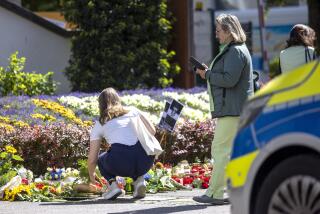Bomb Suspect Held; Syria Tie Probed
- Share via
BONN — West German police, acting on a tip, arrested a 27-year-old woman Monday on suspicion of planting a bomb in a West Berlin discotheque in 1986 that killed two U.S. servicemen and a Turkish woman and injured more than 200 other people.
Authorities suggested that Christine Gabriele Endrigkeit was apprehended because of her connection with a Jordanian convicted of a previous bombing in West Berlin--which allegedly was masterminded by Syrian intelligence.
The United States blamed the disco attack on Libya and launched an air strike 10 days later on the Libyan capital of Tripoli and the city of Benghazi in retaliation. But Endrigkeit’s purported Syrian connection raised questions as to which nation might have been behind the disco bombing.
In Ottawa, Canada, visiting Secretary of State George P. Shultz said the evidence is clear and convincing that Libya was implicated in the disco attack, Times staff writer Norman Kempster reported. Shultz said that if some other nation were also involved, that “doesn’t lessen the Libyan complicity.”
Shortly after the attack at the La Belle disco on April 5, 1986, the American government announced that it had irrefutable evidence that the Libyan government of Col. Moammar Kadafi was responsible for the bombing. Based on that evidence, the United States carried out the attacks.
The American government said it showed to its allies hard evidence of the Libyan involvement--presumably intercepted communications between Tripoli and the Libyan Embassy in East Berlin. This data, however, has never been made public.
Libya has denied any involvement.
At the time, West Berlin police sources said they thought it was more likely that the Syrians were behind the terrorist operation, but this has never been confirmed officially by investigators there.
West Berlin authorities would not indicate Monday whether Endrigkeit was thought to be operating on orders from Libya or Syria in the bombing.
As though to back the contention that Libya was the culprit in the bombing, State Department spokeswoman Phyllis Oakley announced in Washington the extension until January, 1989, of economic sanctions imposed on Libya two years ago for supporting international terrorism and being a threat to U.S. national security.
Endrigkeit was apprehended in the northern German city of Luebeck. She will face charges today before a West Berlin magistrate.
She was found with a male companion in a youth center called Alternative, whose members hold radical left-wing views, according to police.
In West Berlin, U.S. sources declined to comment publicly on the arrest, but one declared: “We care desperately about this case. We lost a lot of people and that’s why we’d rather not second-guess the Berlin police.”
West Berlin Justice Department spokesman Volker Kaehne said there were “clues” that indicated Endrigkeit could have been working for Ahmed Nawaf Hasi, 36, a Jordanian. He was sentenced to 14 years in prison in November, 1986, for participating in the bombing of the German-Arab Friendship Society in West Berlin, which occurred a week before the disco explosion.
The prosecutor at Hasi’s trial charged that the explosives had been supplied by Syrian intelligence agents operating out of their embassy in East Berlin.
Hasi is a brother of Nezar Hindawi, who was sentenced in London in October, 1986, to 45 years imprisonment for attempting to place a bomb on an Israeli El Al airliner--an act, it was charged, also under Syrian direction.
West German police sources said that they ordered a search for Endrigkeit after documents in Hasi’s apartment indicated that he knew her.
Kaehne said that the “items” found in her rooms, which he did not identify, would probably lead to further arrests.
More to Read
Sign up for Essential California
The most important California stories and recommendations in your inbox every morning.
You may occasionally receive promotional content from the Los Angeles Times.













